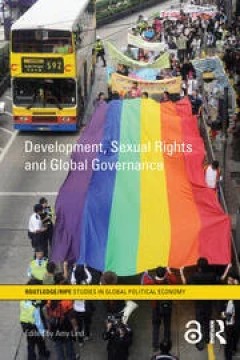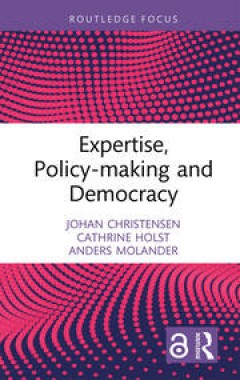Filter by

Development, Sexual Rights and Global Governance
This book addresses how sexual practices and identities are imagined and regulated through development discourses and within institutions of global governance. The underlying premise of this volume is that the global development industry plays a central role in constructing people’s sexual lives, access to citizenship, and struggles for livelihood. Despite the industry’s persistent insis…
- Edition
- 1st Edition
- ISBN/ISSN
- 9780203868348
- Collation
- p. 240
- Series Title
- -
- Call Number
- -
Nuclear disarmament and non-proliferation: towards a nuclear-weapon free world?
A PDF version of this book is available for free in open access via www.tandfebooks.com as well as the OAPEN Library platform, www.oapen.org. It has been made available under a Creative Commons Attribution-Non Commercial-No Derivatives 3.0 license and is part of the OAPEN-UK research project. This book examines the current debate on nuclear non-proliferation and disarmament, notably the intern…
- Edition
- 1st Edition
- ISBN/ISSN
- 9780203842591
- Collation
- -
- Series Title
- -
- Call Number
- -

Cyber security politics :socio-technological transformations and political fr…
- Edition
- -
- ISBN/ISSN
- 9781003110224
- Collation
- -
- Series Title
- -
- Call Number
- -
- Edition
- -
- ISBN/ISSN
- 9781003110224
- Collation
- -
- Series Title
- -
- Call Number
- -

„Beyond the Wall”: Game of Thrones aus interdisziplinärer Perspektive
Dieses Open-Access-Buch beleuchtet das Serienphänomen „Game of Thrones“ aus unterschiedlichen wissenschaftlichen Perspektiven: Die rechtswissenschaftliche trifft auf die sprach-, musik-, literatur- und sozialwissenschaftliche, ferner die (kunst-)historische, psychologische und theologische Perspektive. Die Beiträge zeigen auf, dass die Serie reiche Anknüpfungspunkte für die wissenschaft…
- Edition
- 1
- ISBN/ISSN
- 978-3-658-36145-7
- Collation
- -
- Series Title
- -
- Call Number
- XIV, 287

Expertise, Policy-making and Democracy
ABSTRACT This book offers a concise and accessible introduction to debates about expertise, policy-making and democracy. It uniquely combines an overview of recent research on the policy role of experts with discussions in political philosophy and the philosophy of expertise. Starting with the fact that well-functioning democracies require experts and expert knowledge, the book examines two ty…
- Edition
- -
- ISBN/ISSN
- 9781003106555
- Collation
- -
- Series Title
- -
- Call Number
- -

Russia-China Relations
This open access book examines Russia-China relations across a variety of civilian and military areas of cooperation. Leading experts in the field present empirical case studies covering a wide range of strategic cooperation areas between Russia and China, such as technological, military, economic and political cooperation. The contributing authors shed new light on Chinese and Russian strategi…
- Edition
- 1
- ISBN/ISSN
- 978-3-030-97012-3
- Collation
- -
- Series Title
- Global Power Shift
- Call Number
- XXI, 315

Framing Global Mathematics
This open access book is about the shaping of international relations in mathematics over the last two hundred years. It focusses on institutions and organizations that were created to frame the international dimension of mathematical research. Today, striking evidence of globalized mathematics is provided by countless international meetings and the worldwide repository ArXiv. The text follows …
- Edition
- 1
- ISBN/ISSN
- 978-3-030-95683-7
- Collation
- -
- Series Title
- -
- Call Number
- CCCLXXXIV, 20

International Actors and the Formation of Laws
This open access book addresses the discourse that creates, modifies, and reshapes the law, as well as discourse participants. The book focuses on the actors operating in legal regimes and their subtly, bluntly, or even outright aggressive impact on the formation of laws. As the book examines the intersection of domestic, European, international, and even transnational, legal regimes where new …
- Edition
- 1
- ISBN/ISSN
- 978-3-030-98351-2
- Collation
- -
- Series Title
- -
- Call Number
- XVIII, 197

Beyond Data
This open access book focuses on the impact of Artificial Intelligence (AI) on individuals and society from a legal perspective, providing a comprehensive risk-based methodological framework to address it. Building on the limitations of data protection in dealing with the challenges of AI, the author proposes an integrated approach to risk assessment that focuses on human rights and encompasses…
- Edition
- 1
- ISBN/ISSN
- 978-94-6265-531-7
- Collation
- -
- Series Title
- Information Technology and Law Series
- Call Number
- XXIII, 200

Contemporary issues in digital marketing
- Edition
- -
- ISBN/ISSN
- 9781003093909
- Collation
- -
- Series Title
- -
- Call Number
- -
- Edition
- -
- ISBN/ISSN
- 9781003093909
- Collation
- -
- Series Title
- -
- Call Number
- -
 Computer Science, Information & General Works
Computer Science, Information & General Works  Philosophy & Psychology
Philosophy & Psychology  Religion
Religion  Social Sciences
Social Sciences  Language
Language  Pure Science
Pure Science  Applied Sciences
Applied Sciences  Art & Recreation
Art & Recreation  Literature
Literature  History & Geography
History & Geography